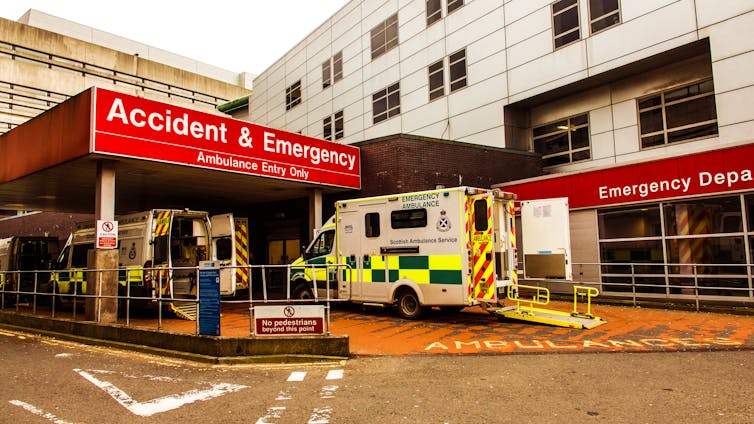COVID-19 slashed health-care use by more than one-third across the globe. But the news isn't all bad
- Written by Ray Moynihan, Assistant Professor, Bond University
It’s no secret the COVID-19 pandemic has changed many aspects of our lives. One is how often we access health care.
We’ve conducted what we believe is the first systematic review on this topic, bringing together studies documenting changes to health-care use during COVID-19 from around the world.
We found a 37% reduction across all parts of the health system, from February to May this year, compared to the same period in previous years.
Many people will suffer as a result of having missed out on lifesaving care, such as for heart disease or cancer. But others may benefit, by avoiding care they did not need in the first place.
Dramatic drops across all categories
Together with a global team of researchers and doctors, we identified 81 studies from 20 countries, including Australia. It’s important to note our work is currently undergoing peer review, although in keeping with much pandemic-related research, it’s available as a preprint.
Between February and May 2020, those studies reported on around 7 million health services, such as having a scan or an operation, compared to roughly 11 million in the same period the year before.
Overall, there was a 37% median reduction across all categories of health care. Visits to seek care, such as going to a GP or the emergency department fell by 42%; admissions to hospital dropped 28%; the use of diagnostic tests fell 31%; and the use of treatments, such as procedures to treat heart disease, dropped by 30%.
 Fewer people are presenting to emergency departments around the world during the pandemic.
Shutterstock
Fewer people are presenting to emergency departments around the world during the pandemic.
Shutterstock
One of the biggest individual studies in our review found a 42% reduction in visits to all United States emergency departments during April. Weekly visits fell from 2.1 million in 2019 to just 1.2 million in 2020. For visits among children the drop was 72%.
A smaller study in Australia found a 37% fall in emergency department visits at two hospitals in Victoria during April.
There are many possible reasons for these trends. For example, people may have stayed away from hospitals for fear of contracting COVID-19. People have also been unable to access some types of health care, as services like elective surgery were suspended.
Rates have bounced back in many places, but some remain significantly lower than previous years. Total admissions to hospitals in New South Wales, for example, were still down in the most recently available figures (up to the end of June).
In a small number of studies we also found some things increased, including treatments for acute stroke. And future studies will likely find large increases in services such as telehealth.
Reductions are greater for less severe illness
Many of the studies in our review found reductions in use were greater for people with milder illness. That US study found the biggest fall in emergency department attendance was for people with abdominal pain.
Likewise, the Australian study found bigger falls among those with the least acute problems. For example, attendance was lower than expected for people with gastroenteritis and wrist fractures — but there was no change in category 1 triage patients (the most severe who require urgent attention).
Notably, several studies found larger reductions in admission for milder forms of heart attacks than for more severe forms. A large English study in late March found national admissions for the more severe form dropped 23%, while admissions for the milder form dropped 42%.
In terms of mental health, a study from Paris found a 55% reduction in emergency visits in the first four weeks of lockdown, but with greater reductions in visits for anxiety and stress, and smaller reductions for psychotic disorders.
At the height of the pandemic, doctors in Northern Italy found a 68% drop in presentations to children’s emergency departments. The reduction in attendance for the “white” triage category, the minor conditions which don’t require a doctor, was 89%.
Read more: Most people want to know risk of overdiagnosis, but aren't told
An opportunity to reduce unneeded care
Clearly many people will have been harmed by missing out on needed care. As the authors of the English study on heart attack admissions made clear, public campaigns are important to assure people that visiting hospital is safe. Reluctance to call an ambulance when experiencing severe symptoms, they write, results in “unnecessary deaths and disability”.
But many experts around the world are also seeing this crisis as a potential opportunity to wind back unnecessary care, and to free up resources for those most in need.
The Italian doctors who found significantly fewer children presenting to hospital with mild complaints suggested this has freed resources to “provide critical services to patients suffering from medical emergencies in a timely manner”.
 Studies in our review showed fewer children are presenting to hospital during COVID-19.
Shutterstock
Studies in our review showed fewer children are presenting to hospital during COVID-19.
Shutterstock
There’s already a lot of evidence about overuse of medical services and overdiagnosis, also known as low-value care. Examples include the inappropriate use of antibiotics and opioids, unnecessary diagnoses of prostate cancer, and the overuse of CT scans for children.
As health systems continue responding to the pandemic and deal with the urgent backlog of care, addressing this harmful waste becomes even more pressing.
Read more: The coronavirus ban on elective surgeries might show us many people can avoid going under the knife
Commentators in the British Medical Journal and the New England Journal of Medicine, and influential doctors’ groups, have echoed this view.
The tragedy of the pandemic has underscored the importance of reducing unnecessary and harmful care, and offers us a real opportunity to address this problem.
Authors: Ray Moynihan, Assistant Professor, Bond University


















